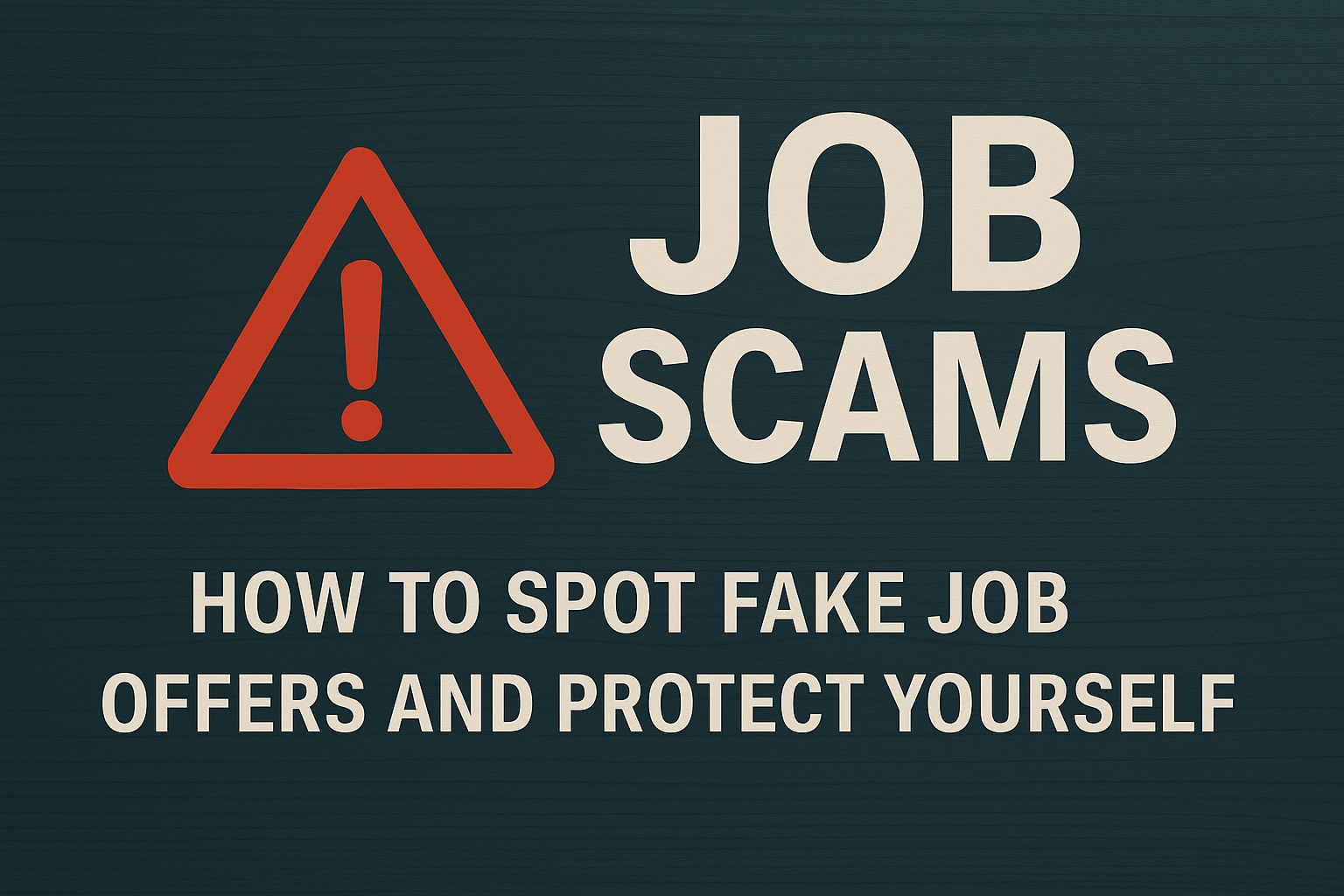In today’s digital job market, scammers advertise fake jobs everywhere legitimate employers do — job boards, social media, online ads, even email and text messages. These scams can cost job seekers their money, their personal information, and even their identity.
If you’re searching for a new career opportunity, staying alert is essential. This guide covers the most common types of job scams, red flags to watch for, and exactly what to do if you’ve already paid a scammer.
Common Types of Job Scams (And How They Work)
Work-from-Home Job Scams
Remote work is more popular than ever — and scammers know it. They post ads claiming you can earn thousands of dollars from home with “no experience needed,” “minimal effort,” or “flexible hours.”
But instead of paying you, they trick you into paying them for:
- Starter kits
- Fake certifications
- Worthless training
- “Administrative fees”
Many of these scams also involve fake check schemes, where scammers send you a check and ask you to return part of the “overpayment.” The check later bounces, and the bank holds you responsible.
If a job promises fast money for little work, it’s a scam. Every time.
Examples of Work-From-Home Scams
- Reshipping Scams: You’re hired as a “quality control manager” or “logistics coordinator.” Your role? Receive packages, repackage items, and ship them overseas. These products are usually purchased using stolen credit cards. The “job” disappears before your first paycheck, and your personal info may be stolen.
- Reselling Scams: Scammers promise discounted luxury products you can resell for profit. You pay for merchandise that either never arrives or turns out to be worthless junk.
Nanny, Caregiver, and Virtual Assistant Job Scams
These scams often appear legitimate, using job boards, personal emails, or even fake references from your school or community.
The scammer sends you a check before you start working and instructs you to:
- Deposit it
- Keep part as payment
- Send the rest elsewhere
This is always a fake check scam. No legitimate employer will ever ask you to handle money like this.
Mystery Shopper Scams
Getting paid to shop sounds perfect — but most mystery shopper “opportunities” online are fraudulent.
Red flags include:
- Paying for certification
- Paying to access job lists
- Being asked to deposit a check and send money back
Legitimate mystery shopper companies never ask you to pay for the job.
Job Placement and Recruiting Service Scams
Although many staffing firms (like DAVRON!) are ethical and employer-paid, some fraudulent services charge job seekers upfront for access to “exclusive jobs” or guaranteed placements.
Warning signs:
- Paying fees before getting help
- Old or fake job listings
- Empty promises or “guarantees”
A real recruiting agency never charges candidates to find a job — employers pay those fees.
Government and Postal Job Scams
Scammers post ads claiming they can get you a job with the federal government or the U.S. Postal Service — for a fee.
Here’s the truth:
- Federal job listings are free and available at USAJOBS.gov
- Postal Service jobs are free at USPS.com/employment
- You never need to pay anyone to apply
If someone charges you for government job access, it’s a scam.
How to Avoid Job Scams: Essential Tips for Job Seekers
Before accepting any job offer, follow these steps:
Research the Company Thoroughly
Search the company name plus words like:
- “Scam”
- “Review”
- “Complaints”
- “Fraud”
No search results don’t guarantee legitimacy, but negative reviews are strong warning signs.
Talk It Over With Someone You Trust
Explain the job offer to a friend, mentor, or family member. Scams often sound fishy when spoken out loud.
Never Pay to Get a Job
Legitimate employers will never charge:
- Application fees
- Training fees
- Equipment fees
- Certification fees
- Membership fees
If they want your money, walk away.
Never Rely on a “Cleared” Check
Banks are required by law to make funds available quickly, even before checks fully clear.
A check can appear valid for days — then bounce.
If an employer sends you money and asks you to:
- Return part of it
- Transfer it
- Buy gift cards with it
…it is 100% a scam.
What To Do If You Paid a Scammer
Act fast. Immediately contact the company or service you used to send the payment:
- Bank or credit card company – request a chargeback
- Mobile payment apps (Venmo, Cash App, Zelle) – report unauthorized use
- Wire transfer service – request cancellation if possible
- Gift card company – report the card number
- Crypto exchange – report fraud immediately
You may be able to reverse the transaction if you act quickly. For step-by-step guidance, read: “What To Do If You Were Scammed” on FTC.gov.
Report Job Scams
Report Job Scams
Reporting scams helps protect other job seekers.
Submit reports to:
- Federal Trade Commission (FTC): ReportFraud.ftc.gov
- Your State Attorney General
You can also learn more about avoiding scams at FTC.gov/scams.
Final Thoughts: Stay Alert and Protect Your Career Journey
Job searching should be exciting — not dangerous. By staying aware of common job scams and knowing the red flags, you can protect yourself, your money, and your identity.
DAVRON is committed to helping job seekers find real, verified, and legitimate career opportunities in engineering, architecture, construction, and manufacturing. We encourage you to share this guide with anyone actively searching for a job.
If you’d like help reviewing job offers or need guidance in your career search, we’re here for you.

